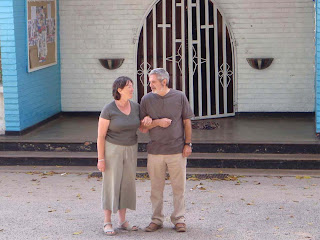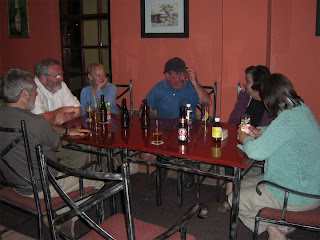Lusaka International Airport.
 As usual there is chaos inside. Its two hours before our flight leaves but we have to join a queue for check-in immediately. There is confusion, people getting into queues for the wrong plane, for the wrong ticket class and so on.
As usual there is chaos inside. Its two hours before our flight leaves but we have to join a queue for check-in immediately. There is confusion, people getting into queues for the wrong plane, for the wrong ticket class and so on.Eventually a BA ground staff man appears and bellows out a few instructions and it settles down.
We go through the baggage check and then through immigration. Into the pleasant, spacious departure lounge and we have a cup of tea. Dave and Sue look in the shops.
The flight is called and we form another queue through a security check, followed shortly by a second before queuing for the last time to get on a plane.
A young look-at-me Englishman with a toddler lets his kid run around before running after him and picking him up then repeating the performance twice more. Look folks, I've got a baby. No one smiles.
Up into the 767. Smiling Stewardess. Seats in the middle again. Less Americans, more Zambians on this flight. A stewardess comes down the aisle with a flyspray squirting it every few feet. It is just as ineffective at pest control as it was forty years ago.
The pilot gives us some chat as we settle in. The plane is full again.
We leave on time; its a daylight flight so sleep isn't easy. We read, doze, Sue produces a couple of crosswords, watch the TV and eat.
The toddler runs down the aisle followed by Mr. Look-at-me saying, 'Come back'. Then he appears in the opposite aisle. Everyone notices that he's got an extendable lead and could control his kid. No one looks at them.

The hours pass. We start the descent to Heathrow and have to stooge around above central London for ten minutes waiting for air traffic before finally making a smooth landing.
Another ten minutes taxiing across the airport and then another twenty minutes before we get our bags, clear customs and walk out to see Kev jiggling the car keys and grinning at us.
Twenty minutes later we're in a traffic jam on the M25.


















































